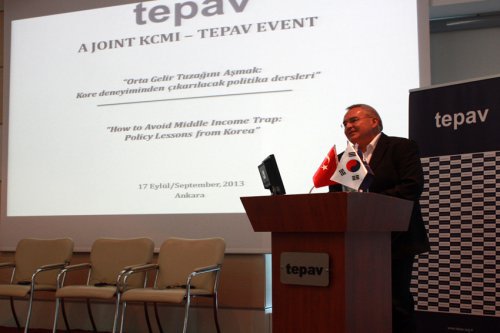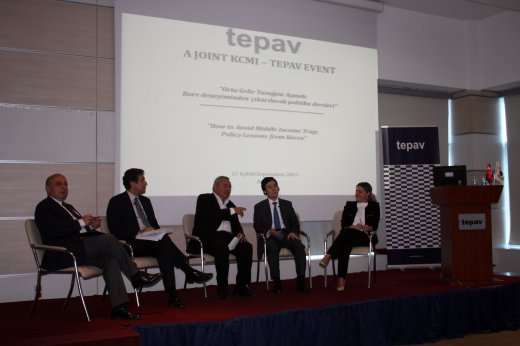TEPAV Director Sak: "The Latest Development Plan Speaks More Korean" A meeting themed “How to Avoid the Middle Income Trap” hosted a debate on the divergence between South Korea and Turkey, which had similar economic structures in the 1970s.

ANKARA – TEPAV held a meeting themed “How to Avoid the Middle Income Trap: Policy Lessons from Korea” on Tuesday, 17 September 2013, with the contributions of the Korea Capital Market Institute (KCMI). Delivering the opening remarks, TEPAV Director Güven Sak stated that Turkey, which had a similar economic outlook to that of South Korea in the 1970s, later fell into the middle income trap, although the latest development plan “spoke more Korean” as it is the first text focusing on quality and concrete policy areas.
Sak stressed that in the 1970s, the GDPs of both Turkey and Korea were 20 percent that of the US, and that Korea improved its GDP to 60 percent while Turkey’s had reached a sluggish 25 percent. He said, “If a country’s GDP as a ratio to America’s GDP was the same both in the 1970s and 2010s, that country is stuck in the middle income trap. Our Korean friends have done something correct, we have not.” Concerning the Tenth Development Plan, he said it was necessary to remain optimistic for the medium-term.
Sangkyu Lee, Ambassador of South Korea in Ankara, stated that Korea’s GDP had reached $20,000 six years earlier and it was expected to increase to $40,000 in the next decade. He said that although the country had a sound budget, competition in the services sector was weak and problems concerning transparency and employment continued. Pointing at Turkey’s current account deficit problem with reference to the 2023 goals, he said that Turkey should increase investments in education and R&D. Lee emphasized that the share of R&D expenditures in GDP was 0.7-0.8 percent in Turkey, compared to 3.74 percent in Korea.
Concrete targets, education reform, and the role of innovation incentives
Hyoung Tae Kim, president of the Korea Capital Market Institute and keynote speaker of the meeting said that some things changed after the 1980s and cited the identification of specific economic targets and selective industrial policies, the expansion of university education, and the promotion of innovativeness for high-technology as factors which helped South Korea succeed after the big crisis in 1997. He said, “Today large firms are strong enough, so we are supporting small and medium-term enterprises. We want to support innovative firms and innovation.”
Stressing that following the crisis the government and large companies suffered serious financial problems, he said “During this process policy issues were also faced. Per capita income decreased from $13,000 and to come back to normal, to the pre-crisis levels, took about five years.” Saying that Korea’s credit rating had been downgraded following the crisis, he added, “we returned to the original position in September 2012. It took 14 years to achieve the pre-crisis level.” Kim stated that in the 2007 crisis the economy had been sound and the cause of problems had been the trade surplus.
Emphasizing that although it could be useful for Turkey to take the Korean experience as a reference, Turkey had to do it in its own way. He added that Turkey had to lower its current account deficit.
Panel session on planning and the Tenth Development Plan
The meeting continued with a panel session titled “A General Discussion: How do Korea and Turkey Compare in Terms of Development Experience?” under the moderation of TEPAV Director Güven Sak. Panelist Cüneyd Düzyol, deputy undersecretary of the Ministry of Development of Turkey, gave detailed information about the Tenth Development Plan. Selin Sayek, professor of economics at Bilkent University, stated that they wanted to see the concrete impact of development plans on daily lives while Ercan Erkul of Priva Consulting said that such texts had to go beyond being “wish lists.” Hyoung Tae Kim drew attention to the rising importance of bottom-to-top communication channels in planning along with economic growth.

Savings and savings-oriented education policy needed
During the question and answer session, Düzyol said that the new plan gave a new impulse to the economy, particularly concentrating on human capital, technology, and foreign capital. Sayek emphasized the need to increase savings and design a savings-oriented education policy.
During the final session of the meeting discussions concentrated on boosting savings and promoting entrepreneurship. Dr. Jongmin Kim of the KCMI Department of Fund and Pension delivered a presentation titled “Policies to Boost Savings via Capital Markets.” Assessing the outlook for Turkey, TEPAV Finance Institute Director Prof. Dr. Fatih Özatay said, “Turkey’s savings rate is unequivocally low. Savings alone are not enough but are required for long-term growth.”
Korea is more conservative than Turkey in entrepreneurship, but…
Yong Rin Park, Head of Financial Services Industry of KCMI, delivered a presentation titled “Fostering Entrepreneurship in a Conglomerate-dominated Economy.” TEPAV Economic Policy Analyst Ussal Şahbaz gave information about Turkey’s entrepreneurship perspective. Stating that South Korea was more conservative in entrepreneurship, venture investments in Turkey were only one-tenth those in Korea. Adding that grant mechanisms were not sustainable in Turkey, unlike in Korea, he drew attention to the venture capital union and the crowdfunding model in the latter.
Please click here for the presentations in Turkish.














